According to a statistical record by Medicare in 2020 and 2021, over two-thirds (around 70.5%) of their clients worldwide reported that their family members suffer from extreme levels of hair loss. Hair problems can be due to stress, lack of proteins and vitamins, birth control pills, pregnancy, and even hereditary!
Have you been facing hair fall and dandruff problems? Do you have bald spots, split ends, or thin hair? Or did your hair just stop growing after you cut it at home? We would have come across one of these problems during some stage of our lives. All our beautiful hair just falling off is one of the saddest sights to see! So, it is essential to know the reason behind your hair fall to find its solution.
If you have been trying numerous hair treatments and still see no results, then it is high time you switch to natural methods. Not only are home remedies good for your hair in the long run, but it is also effective if you simply have the patience and time to give your hair the care it needs. This article will provide you with a clear idea of making hair thicker and fuller naturally with home remedies.
Do natural homemade remedies really work?
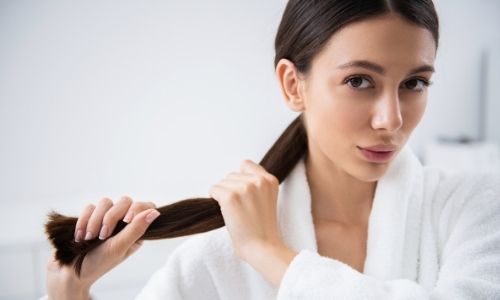
Before we jump into how we can use kitchen ingredients to make natural remedies, let us discuss one question that we often think about – do home remedies actually work? YES, we get results from DIY treatments, but they take time. Also, note that not all of them work!
Some natural home remedies need to be applied to your hair, while certain others need to be consumed depending on the reason for your hair loss. If you are suffering from alopecia or nutritional deficiency, you need to focus on your food intake.
Hair fall or losing thickness can also result from not taking proper care, for which one needs to follow a regular hair care routine. It can also be due to chemical products and bad hairstyling techniques.
Home Remedies for Hair Growth and Thicker Hair
1. Eggs
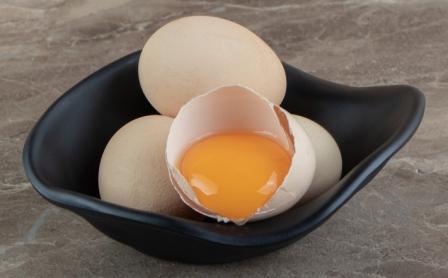
It’s a known fact that egg is rich in protein but did you know that 70% of your hair is also made out of keratin proteins? The nutrients in an egg, like proteins, minerals, and vitamin B complex, can help to make our hair strong, thick, and healthy! Consuming protein-rich food like egg ensures that the hair is not weak, brittle, or dry but can also be used as a hair mask.
To make the egg hair mask –
- Beat one or two eggs together and gently massage them onto your scalp. Leave it on for 30 to 45 minutes and rinse with warm water, shampoo, and conditioner.
- You can also add one tablespoon of oil (olive oil, castor oil, or coconut oil) and two tablespoons of water with the eggs. Mix thoroughly and massage it gently onto your scalp. Leave it for 15 to 20 minutes and rinse it off.
- Another alternative – Add two eggs with two teaspoons of yogurt or curd and apply it onto your scalp. Leave it for 30 minutes and rinse it off with warm water and a mild shampoo and conditioner.
- Combine egg with one tablespoon of honey and two tablespoons of milk for a different hair mask. Leave it for 30 minutes and rinse with a mild shampoo.
Repeat this twice a week for the best results!
2. Olive Oil
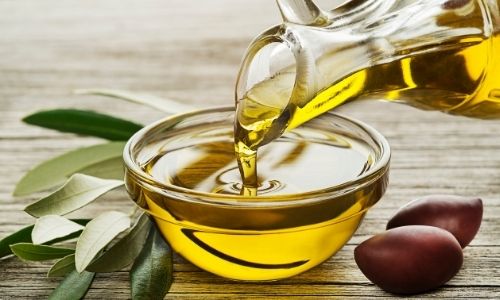
Apart from proteins, omega 3 is also an essential nutrient for healthy hair growth as it keeps our scalp hydrated. Our body cannot produce this fatty acid, so it must be consumed via food. But did you also know that applying olive oil to your hair follicles promotes thicker hair growth??
Ways to use olive oil for soft and hydrated hair –
- Start by heating the necessary oil for your hair. Gently massage it onto your scalp and leave it for 30 to 60 minutes. Ensure you rinse it off with warm water, mild shampoo, and a nourishing conditioner.
- Another alternative – you can add one tablespoon of honey to the heated olive oil and leave it overnight. Honey moisturizes the dry scalp, strengthens hair follicles, restores its shine, reduces fizziness, and softens hair.
3. Castor Oil
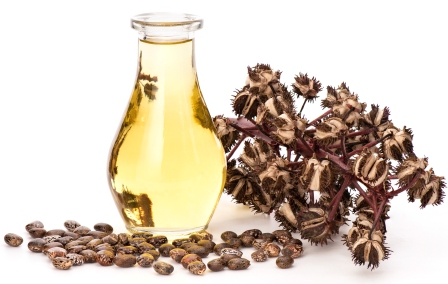
Apart from olive oil, you can also use castor oil. It has nutritional benefits like proteins, Vitamin E, ricinolein acid, and omega-6 fatty acids that can promote hair growth strengthen the root to prevent breakage. Also, castor oil acts as a cleaning product thanks to its disinfectant properties; hence it helps treat the dirt build-up.
Using castor oil is similar to the way we use olive oil – heat the oil and massage it onto your scalp. Leave it for 30 to 60 minutes and rinse it off with warm water, shampoo, and conditioner. Massaging the oil into the scalp increases blood circulation and reduces split-end problems.
Other ways you can use castor oil –
- Reap benefits both castor oil and olive oil by adding both in the same ratio. Along with this, add a teaspoon of methi seeds and heat the oil mixture till it turns light brown. Gently massage the oil mixture after it cools down and leave it for 30 to 45 minutes.
- You can also mix castor oil with mustard oil. Add five teaspoons of castor oil into a small bowl with two teaspoons of mustard oil and heat the mixture. Apply on your scalp and wash it off with a mild shampoo after 30 to 45 minutes.
4. Jojoba Oil
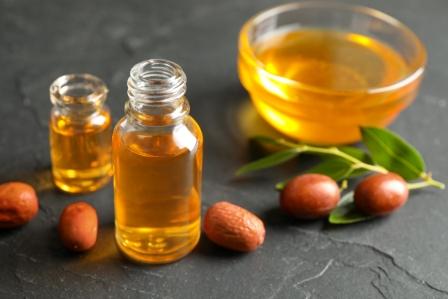
Do you have an itchy scalp? Well, here is your solution. Jojoba oil boosts blood circulation and removes dead flakes (dandruff), reducing the itchiness caused by dry hair or dead skin. The oil is rich in fatty acids like omega-6 and omega-9, and vitamin E, which helps fight free radicals. Massaging jojoba oil onto your scalp unclogs the dirt in hair follicles.
How to use jojoba oil?
- In a bowl, take one teaspoon of jojoba oil, add in one egg yolk, a teaspoon of honey, and four to five drops of lemon juice. Mix well and apply to your scalp. After 30 to 45 minutes, rinse with a mild shampoo. Lemon juice also helps to remove build-up and maintain scalp health.
5. Juniper Oil
Another oil that helps with dandruff problems is juniper oil. It has astringent and antiseptic properties, which help unclog and remove excess dirt build-up, preventing acne formation on your scalp. It is pretty easy to use juniper oil – add two to three drops of almond oil to a teaspoon of juniper oil and gently massage it onto your scalp. Leave it for 30 to 45 minutes and rinse with warm water and a good shampoo.
6. Coconut Oil
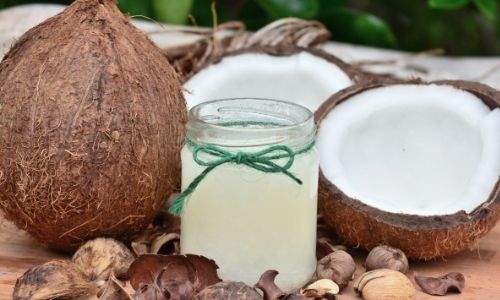
Like olive oil, coconut oil is also rich in lauric, capric, and fatty acids, which can prevent protein loss during hair thinning. Other than that, it also has antimicrobial and anti-fungal properties, which help to fight the free radicals. No wonder all have used this oil for numerous generations!
How to use coconut oil as a home remedy?
- In a bowl, add four teaspoons of coconut oil, juice from an entire lemon, and two teaspoons of honey. Mix well and apply on your scalp. After an hour, wash it off with warm, mild shampoo and conditioner.
- Another alternative– Take a ripe banana and make it into a paste. Add the paste, coconut oil, and a teaspoon of coconut milk and mix well. Apply the paste onto your scalp. Rise after 30 to 40 minutes with a sulfate-free shampoo.
- Mix coconut oil with other essential oils like castor oil, almond oil, or argan oil and reap the benefits from all.
- Add coconut oil, honey, and egg. Mix and apply the paste onto your scalp.
7. Orange

This might come out as a surprise to most people, but the vitamin C, vitamin B12, and vitamin E content in oranges promotes hair growth and strengthens the hair follicles. At the same time, the acid content cleanses the hair product residue and unclog dirt, thereby reducing dandruff.
It is simple to make orange puree – add a fresh and ripe orange into a blender and blend it. Apply the hair mask onto your scalp and leave it for an hour. Wash your hair with a mild shampoo and conditioner.
Orange juice acts as a conditioner as well. Apply the blended puree onto your hair after you shampoo it. Rinse it off after ten minutes to get smooth, silky, and hydrated hair.
8. Aloe Vera Gel

Aloe vera is rich in vitamins, amino acids, fatty acids, zinc, copper, and so on, which is why it is very popular in the beauty industry. Aloe Vera Gel can be used as a face mask, cleanser, hair mask and is considered highly healthy for consumption. Not only does it reduce hair loss, but it also unclogs hair follicles and reduces dandruff.
If you have an aloe vera plant at home, it is best to use it rather than buying gel, as we are never sure what is added to those commercial products. Making aloe gel might be a little time-consuming, but it is pretty simple and totally worth it. The steps are as follows –
- Cut aloe leaves from the bottom of the plant. Please make sure they are fresh, pulp, and bright green.
- Keep the leaves upright on a plate, the cut area facing down. This is done to remove the latex found in aloe vera, which can be poisonous and cause irritation. Leave the plant upright overnight, so all the latex drains out.
- Cut off the edges of the leave so that the spikes don’t hurt you.
- Peel the top outer coating so that you are left with the sticky, slippery natural aloe gel.
- Take a spoon, scoop out all the gel into a mixer and blend it.
- Pour out the gel into an ice tray and freeze it overnight.
- Transfer it into a zip lock bag and date it. Frozen aloe gel lasts about 8 to 12 months.
- If you do not want to freeze your aloe vera, you can add 2 grams of vitamin C to the gel and blend it. Another way to naturally preserve aloe gel is to add honey to a 1:1 ratio. The gel lasts around 5 to 8 months in both these methods but makes sure you use it up as soon as possible.
9. Avocado
Like orange, this might look like an odd one on the list. Being a great source of biotin, consuming avocado helps hair growth. Also, since it is an excellent source of Vitamin E, it can act as a moisturizer and hydrate our skin. You can simply use avocado oil or make a hair mask. The potassium and magnesium content in the oil helps seal the cuticle cells, thereby reducing the risk of hair breakage.
Making an avocado mask is not complicated –
- Cut the avocado in half. Remove the seed and scoop out the inside.
- Blend it and add one tablespoon of olive oil. Mix well.
- Apply the mask onto your scalp and leave it for 30 to 45 minutes.
- Wash using water and a mild, sulfate-free shampoo.
10. Apple Cider Vinegar

Are you having dandruff problems? Apple Cider Vinegar is your remedy as it contains vitamin C – fights free radicals, vitamin B – improves blood circulation, and acetic acid – antibacterial properties. To get an apple cider vinegar hair mask, combine ½ cup of the vinegar to grated lemon peel. Massage it onto your scalp and leave for 20 to 30 minutes. Wash with a mild shampoo.
11. Amla (Indian Gooseberry)

Amla is a natural immunity booster as it contains essential fatty acids, vitamin C, iron, antioxidants like gallic acid and carotene. Not only is it a favorite snack among most Indians, but it also has numerous hair benefits as it provides deep root conditioning stimulates thicker and softer hair growth while fighting dandruff and premature greying.
How to make amla hair oil?
- Cut 200 grams of amla into small pieces.
- Blend the amla pieces with one cup of fresh curry leaves and 100ml of coconut oil.
- Transfer the puree into a saucepan and heat it on low. Mix until it turns golden brown.
- Turn the heat off and let it cool.
- Add 100 ml of coconut oil into the saucepan.
- Get a clean, dry, air-tight container and strain the mixture into the container. It has for one to two months at room temperature.
If you want to make a thicker hair mask, you can add two teaspoons of shikakai powder into the oil and mix well. Gently massage it onto your scalp and leave it for 45 minutes. Do this twice a week for notable results.
Is diet important?
If your diet does not have the required amount of proteins, healthy fats, and vitamins, it can lead to hair thinning. Listed below are the nutrients needed to have healthy, smooth, and hydrated hair.
- Vitamin A, found in carrots, papaya, mango, etc., helps hydrate the scalp, thereby reducing itchiness and flaky skin.
- Vitamin C in citrus fruits like lemon and orange acts as antioxidants.
- Vitamin D is a great stress buster – a significant cause of hair fall. It improves hair follicle production and promotes hair growth. Consume eggs, oily fish, oranges, yogurt, and so on to get your daily dose of vitamin D.
- Vitamin E, found in seeds, nuts, fruits, and vegetables, helps protect our skin from harmful UV rays.
- Want good hair texture? Your answer is Biotin (also known as Vitamin H or coenzyme R!
- Zinc is essential as it affects the level of DHT (dihydrotestosterone) in our body. When zinc level decreases, DHT level increases, thereby increasing hair fall. Consume food rich in zinc content like nuts, eggs, and fish.
- Iron is important for hair growth as it directly affects our hair follicles. Iron-rich food includes jaggery, lentils, red meat, and green vegetables.
- Remember how our hair is made up of keratin protein? Amino acids help produce keratin. So, eat protein-rich foods like meat, eggs, etc!
- Omega-3 fatty acids provide hydrated skin and scalp. Food rich in omega-3 fatty acids includes fish oil, avocado, etc.
You May Also Like To Read:
Best Hair Pack for Hair Growth in India
Best Essential Oil for Hair Growth in India
Your Takeaway
A little bit of patience and some kitchen ingredients can get you a long way when it comes to healthy, thick hair! Oil your hair at least twice a week so that your hair follicles get the nutrients and stay hydrated. Make masks using orange, aloe vera, apple cider vinegar, and so on, and gently massage it onto your scalp. Always use a mild, sulfate-free shampoo while rinsing. And remember – your diet is extremely important!
I hope you found this article helpful. If you have any doubt, get back to us using the comment box.


